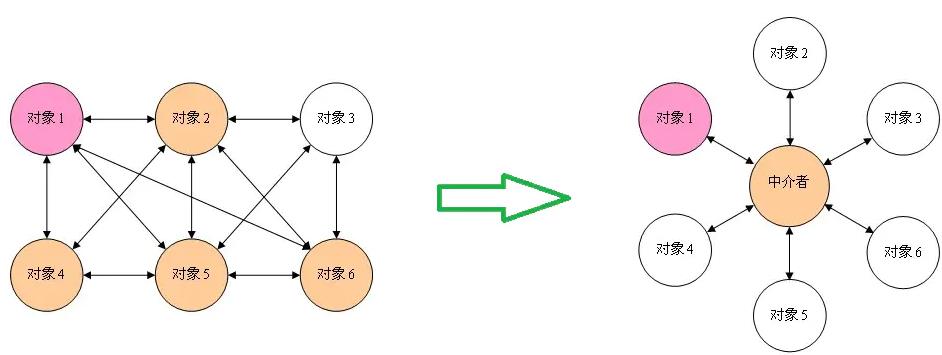Spring 版MediatR--中介者模式实现库
Posted 诸葛小亮
tags:
篇首语:本文由小常识网(cha138.com)小编为大家整理,主要介绍了Spring 版MediatR--中介者模式实现库相关的知识,希望对你有一定的参考价值。
背景
C# 版本库 MediatR 是一个中介者模式实现类库,其核心是一个中介 者模式的.NET实现,其目的是消息发送和消息处理的解耦。它支持单播和多播形式使用同步或异步的模式来发布消息,创建和帧听事件。
java中没有找到类似类库,在对MediatR源码阅读中,发现其主要思路是借助IOC获取Request与Handler对应关系并进行处理。
中介者模式
中介者模式:用一个中介对象封装一系列的对象交互,中介者使各对象不需要显示地相互作用,从而使耦合松散,而且可以独立地改变他们之间的交互。

使用中介模式,对象之间的交互将封装在中介对象中,对象不再直接交互(解耦),而是通过中介进行交互,这减少了对象之间的依赖性,从而减少了耦合。

应用
单播消息传输
单播消息传输,也就是一对第一的消息传递,一个消息对应一个消息处理,通过 IReust 抽象单播消息,使用 IRequestHandler 进行消息处理
@ExtendWith(SpringExtension.class)
@Import(
value = {
Mediator.class,
PingPongTest.PingHandler.class,
}
)
public class PingPongTest {
@Autowired
IMediator mediator;
@Test
public void should() {
String send = mediator.send(new Ping());
assertThat(send).isNotNull();
assertThat(send).isEqualTo("Pong");
}
public static class Ping implements IRequest<String> {
}
public static class PingHandler implements IRequestHandler<Ping, String> {
@Override
public String handle(Ping request) {
return "Pong";
}
}
}
多播消息传输
多播消息传输,是一对多的消息传递,一个消息对应多个消息处理,通过 INotification 抽象多播消息,使用 INotificationHanlder 进行消息处理
@ExtendWith(SpringExtension.class)
@Import(
value = {
Mediator.class,
PingNoticeTests.Pong1.class,
PingNoticeTests.Pong2.class,
}
)
public class PingNoticeTests {
@Autowired
IMediator mediator;
@Autowired
Pong1 pong1;
@Autowired
Pong2 pong2;
@Test
public void should() {
mediator.publish(new Ping());
assertThat(pong1.getCode()).isEqualTo("Pon1");
assertThat(pong2.getCode()).isEqualTo("Pon2");
}
public static class Ping implements INotification {
}
public static class Pong1 implements INotificationHandler<Ping> {
private String code;
public String getCode() {
return code;
}
@Override
public void handle(Ping notification) {
this.code = "Pon1";
}
}
public static class Pong2 implements INotificationHandler<Ping> {
private String code;
public String getCode() {
return code;
}
@Override
public void handle(Ping notification) {
this.code = "Pon2";
}
}
}
实现
核心实现
其主要点是从Spring的ApplicationContext中获取相关接口bean,然会执行bean方法。
核心方法有两个:public(多播)和send(单播)。
借助ResolvableType类型构造解析bean信息,得到信息后从spring中获取对象实例。
/**
* 中介者实现类
* <p>
* 依赖 ApplicationContext
*/
@Component
public class Mediator implements IMediator, ApplicationContextAware {
private ApplicationContext context;
/**
* 发布同步
* <p>
* 根据通知类型和INotificationHandler,从ApplicationContext获取Handler的BeanNames,
* 将 BeanNames 转化为 INotificationHandler 的实例,每个实例调用一次handler
*
* @param notification 通知内容
* @param <TNotification> 通知类型
*/
@Override
public <TNotification extends INotification> void publish(TNotification notification) {
ResolvableType handlerType = ResolvableType.forClassWithGenerics(
INotificationHandler.class, notification.getClass());
String[] beanNamesForType = this.context.getBeanNamesForType(handlerType);
List<INotificationHandler<TNotification>> list = new ArrayList<>();
for (String beanBane :
beanNamesForType) {
list.add((INotificationHandler<TNotification>) this.context.getBean(beanBane));
}
list.forEach(h -> h.handle(notification));
}
/**
* 发送求取
* <p>
* 根据request类型,获取到response类型,
* 根据IRequestHandler、request类型、response类型从ApplicationContext获取
* IRequestHandler实例列表,取第一个实例执行handler方法。
* <p>
* <p>
* 如果为找到handler实例,抛出NoRequestHandlerException异常
*
* @param request 请求
* @param <TResponse> 响应类型
* @return 响应结果
*/
@Override
public <TResponse> TResponse send(IRequest<TResponse> request) {
Type[] genericInterfaces = request.getClass().getGenericInterfaces();
Type responseType = null;
for (Type type : genericInterfaces) {
if ((type instanceof ParameterizedType)) {
ParameterizedType parameterizedType = (ParameterizedType) type;
if (!parameterizedType.getRawType().equals(IRequest.class)) {
continue;
}
responseType = parameterizedType.getActualTypeArguments()[0];
break;
}
}
if (responseType == null) {
// 抛出异常
throw new NoRequestHandlerException(request.getClass());
}
Class<?> requestClass = request.getClass();
Class<?> responseClass = (Class<?>) responseType;
ResolvableType handlerType = ResolvableType.forClassWithGenerics(
IRequestHandler.class,
requestClass,
responseClass);
String[] beanNamesForType = this.context.getBeanNamesForType(handlerType);
List<IRequestHandler<IRequest<TResponse>, TResponse>> list = new ArrayList<>();
for (String beanBane :
beanNamesForType) {
list.add((IRequestHandler<IRequest<TResponse>, TResponse>) this.context.getBean(beanBane));
}
if (list.isEmpty()) {
throw new NoRequestHandlerException(request.getClass());
}
return list.stream()
.findFirst()
.map(h -> h.handle(request))
.orElseThrow(() -> new NoRequestHandlerException(request.getClass()));
}
@Override
public void setApplicationContext(ApplicationContext applicationContext) throws BeansException {
this.context = applicationContext;
}
}
public interface IBaseRequest {
}
多播接口
public interface INotification {
}
单播接口
public interface IRequest<TResponse> extends IBaseRequest {
}
public interface IPublisher {
<TNotification extends INotification> void publish(TNotification notification);
}
public interface ISender {
<TResponse> TResponse send(IRequest<TResponse> request);
}
public interface IMediator extends ISender, IPublisher {
}
多播处理接口
public interface INotificationHandler<TNotification extends INotification> {
void handle(TNotification notification);
}
单播处理接口
public interface IRequestHandler<TRequest extends IRequest<TResponse>, TResponse> {
TResponse handle(TRequest request);
}
public abstract class AbsRequestHandler<TRequest extends IRequest<TResponse>, TResponse>
implements IRequestHandler<TRequest, TResponse> {
@Override
public abstract TResponse handle(TRequest request);
}
public abstract class AbsNotificationHandler<TNotification extends INotification>
implements INotificationHandler<TNotification> {
@Override
public abstract void handle(TNotification notification);
}
public class Unit implements Comparable<Unit> {
public static final Unit VALUE = new Unit();
private Unit() {
}
@Override
public boolean equals(Object obj) {
return true;
}
@Override
public int hashCode() {
return 0;
}
@Override
public String toString() {
return "()";
}
@Override
public int compareTo(@NotNull Unit o) {
return 0;
}
}
public interface IUnitRequest extends IRequest<Unit> {
}
public class MediatorException extends RuntimeException {
}
@Getter
public class NoRequestHandlerException extends MediatorException {
private Class<?> requestClass;
public NoRequestHandlerException(
Class<?> requestClass
) {
this.requestClass = requestClass;
}
}
应用场景
mediatr 是一种进程内消息传递机制,使用泛型支持消息的只能调度,其核心是 消息解耦 ,基于MediatR可以实现CQRS/EventBus等。
解除构造函数的依赖注入
public class DashboardController(
ICustomerRepository customerRepository,
IOrderService orderService,
ICustomerHistoryRepository historyRepository,
IOrderRepository orderRepository,
IProductRespoitory productRespoitory,
IRelatedProductsRepository relatedProductsRepository,
ISupportService supportService,
ILog logge
) {
}
借助 Mediator,仅需构造注入ImediatR即可
public class DashboardController(
IMediator
) {
}
service 循环依赖,使用mediatr 进行依赖解耦,并使用mediatr进行消息传递
两个service类和接口如下
public static interface IDemoAService {
String hello();
String helloWithB();
}
public static interface IDemoBService {
String hello();
String helloWithA();
}
public static class DemoAService implements IDemoAService {
private final IDemoBService bService;
public DemoAService(IDemoBService aService) {
this.bService = aService;
}
@Override
public String hello() {
return this.bService.helloWithA();
}
@Override
public String helloWithB() {
return "call A in B";
}
}
public static class DemoBService implements IDemoBService {
private final IDemoAService aService;
public DemoBService(IDemoAService aService) {
this.aService = aService;
}
@Override
public String hello() {
return this.aService.helloWithB();
}
@Override
public String helloWithA() {
return "call B in A";
}
}
此时,如果通过构造函数或属性注入(@Autowird),程序在运行时会报一下错误, 提示检测是否包括循环引用

使用 mediatr 解耦循环依赖
使用mediatr的service如下,在service构造函数注 IMediator ,并实现 IRequestHandler 接口
public static class DemoAService implements IDemoAService, IRequestHandler<RequestAService, String> {
//private final IDemoBService bService;
private final IMediator mediator;
public DemoAService(IMediator mediator) {
this.mediator = mediator;
}
@Override
public String hello() {
return this.mediator.send(new RequestBService());
}
@Override
public String helloWithB() {
return "call A in B";
}
@Override
public String handle(RequestAService request) {
return this.helloWithB();
}
}
public static class DemoBService implements IDemoBService, IRequestHandler<RequestBService, String> {
//private final IDemoAService aService;
private final IMediator mediator;
public DemoBService(IMediator mediator) {
this.mediator = mediator;
}
@Override
public String hello() {
return this.mediator.send(new RequestAService());
}
@Override
public String helloWithA() {
return "call B in A";
}
@Override
public String handle(RequestBService request) {
return this.helloWithA();
}
}
public static class RequestAService implements IRequest<String> {
}
public static class RequestBService implements IRequest<String> {
}
测试代码如下
@ExtendWith(SpringExtension.class)
@Import(
value = {
Mediator.class,
ServiceCycTests.DemoAService.class,
ServiceCycTests.DemoBService.class,
}
)
public class ServiceCycTests {
@Autowired
IDemoAService aService;
@Autowired
IDemoBService bService;
@Test
public void should() {
String a = aService.hello();
assertThat(a).isEqualTo("call B in A");
String b = bService.hello();
assertThat(b).isEqualTo("call A in B");
}
}
测试结果

关注我的公众号,一起探索新知识新技术

以上是关于Spring 版MediatR--中介者模式实现库的主要内容,如果未能解决你的问题,请参考以下文章